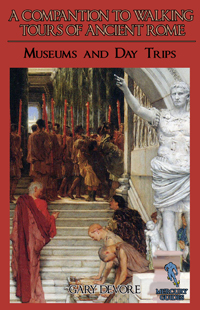
Home |

All Works |

Pantheon
The Fallen Olympians |

Rome Guidebook
Mercury Guides |

Querying
Works in Progress |

Blog |

Academic
Archaeology |

About |
|
 |
These are the current available works of archaeologist and author Gary Devore.
|
|
|
| Fiction |

|
Pantheon
A Novel of the Greek and Roman Gods
The main characters of Pantheon are twelve former gods of the Greeks and Romans. They have been living on earth, powerless but immortal, since humans stopped worshiping them.
Find out more about the novel on its page: Pantheon
|
| |

|
Herr Macbeth
A Shakespearean comedy in two acts
In early 1933, an inept theater company in a drab and weary Berlin is attempting to mount a production of Macbeth.
As scenery falls over, actors forget their lines, and everyone tries to figure out what exactly the antiquated words mean, the world changes outside. Hitler and his National Socialists come to power, and very quickly the brutal deeds of a fictional Scottish thane pale in comparison to those of the new Führer. Those who suddenly find themselves outlaws in their own country must now find a way to survive.
As it turns out, this Shakespeare fellow might actually have a thing or two to say about that.
Herr Macbeth is a full-length play available for reading or producing. Find it at this page.
|
| |

|
Thebes vs. Athens (457 BCE)
A short story set in the 5th century BCE
Thebes vs. Athens (457 BCE) tells the story of two ancient Greek soldiers on opposite sides in a war who encounter each other in the forest, alone and cut off from their respective units. One is a member of the famous "Theban Band."
There is a lot of great fiction and poetry in this new literary journal, and if you would like your own copy, find it very reasonably priced at the Timberline Review's website or on Amazon. |
|
| Guides |

|
Walking Tours of Ancient Rome
A Secular Guidebook to the Eternal City
This guidebook is designed for tourists and scholars who are interested in exploring firsthand the ruins of ancient Rome through a secular, Humanistic, and freethinking lens.
Find out more on the Walking Tours of Ancient Rome page.
|
| |

|
A Companion to Walking Tours of Ancient Rome
Rome's Museums, Ostia, and Hadrian's Villa
A second volume contains detailed entries on the collections of the Capitoline Museums, the Vatican Museums, the Museo Barracco, and the Palazzo Altemps, as well as two detailed day trips that are possible from the city center.
Find out more on the Walking Tours of Ancient Rome page.
|
|
| Essays |

|
Now We Are Rome:
Ancient Roman torture on film and in modern America
This essay is about torture and its (changing) depiction in films about the ancient Roman world. It was originally published as an article in The Awl, but I have expanded it and included full academic citations.
I focus on the films "The Sign of the Cross" (1932), "The Fall of the Roman Empire" (1964), and HBO's "Rome" (2005 & 2007). I also discuss the history of torture both in Rome and the US, specifically under Republican administrations, and how modern torture scandals have influenced how Roman torture has been depicted in film.
A print copy of the expanded essay can be found here.
|

|
Fellini Satyricon WTF
A Scene-by-Scene Analysis of Fellini's Satyricon
This is a DVD commentary in book form, with full color illustrations and scene-by-scene analysis of Frederico Fellini's strange version of the Satyricon. It focuses not only on what the director was attempting to say about ancient culture, but also his use of Roman history and culture to tell the bawdy story of Encolpius and his friends.
It can be found in printed form "at cost" at this site. A free pdf version is available for students and instructors of ancient cinema classes by emailing the author directly (see the ABOUT page for contact info).
|
| |
|
|
|
| Copyright © 2014 and 2024 Gary Devore.
|
|